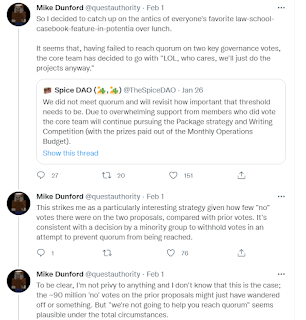This is Joseph.
As I understand it, Web 1 is the original internet tools (e.g., email) that were completely distributed. The downside of these tools was that they were decentralized and hard to update. Which led to Web 2 (applications like Facebook) that could be centrally updated and maintained by a single company.
Web 3 is a strange beast. It involves distributed blockchains that can't be changed and are a permanent record. They are maintained by distributed updates. By calling it Web 3 there is a sense that it is the future of the web. But there are some challenges that I think might be understated.
One, there is a classic libertarian problem. Look at color museum where people can own (and get royalties) on colors that are used in NFTs (or the thing that NFTs point at). How does this improve anything? it does not create new colors that were previously unknown. It does not improve market efficiency but rather, if successful, creates a big source of rent seeking for those who successfully gambled that this would work. Will we need see an alphabet NFT with a race to mint both large and small case "e"? But why should early adopters get permanent property rights on what was previously communal property that they put no effort into creating or making available. It is not like minting the NFTs increased the range of graphics cards.
Two, the blockchain itself is not easily able to handle errors. Look at Ethereum, where a coding error in the DAO (decentralized autonomous organization) led to a fork when a coding error led to the ability to transfer funds in a way that was not intended. There are now two Ethereum blockchains, with both being traded and used. This seems like a bad feature.
Three, people have wondered if DAOs can replace legal contracts. Please look above to see how coding errors can cause problems, and who has worked in any non-trivial coding project in which there are not errors or exploits? Further, what is the enforcement mechanism? Insofar as the coding needs to be interpreted by outsiders, how is this possible (via Mike Dunford who is following the Spice DAO):
Now, as the thread goes on to say, maybe this is ok. But what is the point of a DAO if it does not automatically cover the issue of quorum. If quorum is not needed then why was a decision to ignore it needing to be taken? Remember these are real funds being spent.
Four, the reason you need courts is ambiguity (like that above). There is a famous case of two ships with the same name using the same trade route. This required the court to decide when both parties thought that they were in the right because of an ambiguous phrase in the contract. Now, it is true that you never make these mistakes twice and it is easy to see how to handle this in hindsight. But I cannot imagine a faster way to introduce these problems then using code to "represent" the real world and disputes arising as to what a particular item in the code refers to. If the goal is to tokenize the whole world, how is that feasible, efficient, or better than Web 2?
Five, I tried to get Mark interested in this because he has connections in the music industry. There is an NFT project minting NFTs based on hit music. The artists are discovering this by surprise. Also covered by Mike Dunford, he points out that it is an NFT -- you might not be able to alter the blockchain to remove infringing NFTs. Think about how that lack of flexibility might interact with copyright law.
Now if you are an anarcho-libertarian this might be ok. But this goes back to a central problem of libertarianism - namely, is current wealth justly earned? Does the Queen of England have a clear claim to her wealth that does not involve inheriting wealth that involved injustice (just look at King Henry the VIII and the dissolution of the monasteries). But do we really think that just minting NFTs and giving huge amounts of wealth to early adopters is a fair way to distribute web 3 wealth? Bored Ape Yacht Club NFTs are selling for more than a thousand times their original minting cost in less than a year (April 23rd, 2021) which, should the value be real, is a huge wealth benefit to early adopters.
Of course, these may be mostly scams. In that case Web 3 is just a way to remove excess money from people who are naïve about technology. I don't know. But I am really having trouble seeing how this could possibly work better than Web 1 and Web 2, given the problems noted above. I hope to eventually get Mark to weigh in on how musicians view the minting of NFTs being marketed on their brand without permission, but this sort of action seems to be highlighting the problems that the blockchain is bringing with it.
So what are the benefits?
EDIT: the day after I write this, Bret Devereaux does a very nice piece on the long term sustainability of trying to evade the state via cyberspace. He does not mention NFTs, but the issues with cryptocurrency would seem to extend to those of NFT players like Hit Music trying to evade US copyright and trademark laws.




